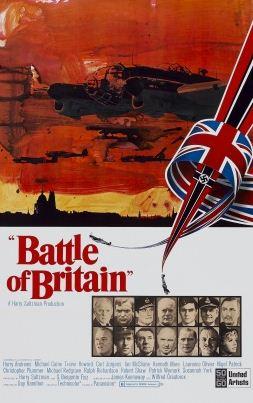
Battle of Britain
Genre:
Drama
In Theaters:
No release information.
The Battle of France in May 1940 has RAF pilots escaping the German Blitzkrieg. These pilots along with British and French Military are quickly evacuated from the heavy strafing of German aircraft. In the next dramatic scene, French civilians watch in awe as a convoy of German troops march into France and take control.
After a radio assessment from the BBC and a look over of the deserted beaches of Dunkirk, comes an inspection of a large German airbase in captured France. Hundreds of Heinkel craft are stationed under Albert Kesselring. RAF Air Chief Marshal Hugh Dowding (Laurence Olivier), realising that an imminent invasion of Great Britain will require every available aircraft and airman to counter it, stops additional aircraft being deployed to France so that they are available to defend Britain. In neutral Switzerland, the German ambassador (Curd Jürgens) officially proposes new peace terms to his British counterpart (Ralph Richardson), stating that continuing to fight the "masters" of Europe is hopeless. The Briton replies that his country will fight on, but privately admits to his wife that the German is likely correct.
British Prime Minister Winston Churchill declares that the battle for France has ended and the Battle of Britain has begun. The Germans realize their army cannot attempt a sea-borne invasion until Britain's air capability is eliminated. Thus the campaign begins with the Luftwaffe launching an early morning assault, the plan being to destroy the RAF on the ground before they have time to launch their Supermarine Spitfire and Hawker Hurricane fighters.
The Luftwaffe also strike radar installations which are essential to Britain's air defence. RAF pilots fight back, but many lack combat experience. A gruelling battle of attrition ensues in which British Air Marshall Dowding wearily remarks, "We are losing." Pressed hard by casualties, the RAF begins to employ foreign pilots who have escaped German-occupied countries. While still training, a Polish squadron (Free Polish) spots an unescorted flight of German bombers. One by one, they peel off and attack in disregard of the British training officer. The Poles are successful and are elevated to operational status.
The turning point occurs when a squadron of German bombers lost in bad weather at night drops bombs on London. In retaliation, the RAF launches an attack on Berlin. Though the damage is negligible, it has a psychological effect on the Germans since it is the first time in history Berlin has been bombed from the air. Enraged, German leader Adolf Hitler orders London to be razed. The city bears the brunt of attack as wave after wave of German bombers arrive, some dropping incendiaries at night. Given a respite, the Royal Air Force is able to repair their airfields and installations such as the radar picket stations. For the first time, large RAF fighter units guarding London can engage the enemy. The city is also at the extreme end of German fighter escort range for their bombers.
The climactic air battle of 15 September 1940 arrives. In an underground bunker, British ground control personnel carefully monitor the approaching enemy via radar and provide targets for their fighters. Intense combat over the London sky follows, with both sides taking heavy losses. In the end, the Royal Air Force proves too much of a challenge. Unwilling to sustain further losses, Hitler cancels Operation Sea Lion, the invasion of the British Isles. Two German sentries, who had earlier seen a French port teeming with Kriegsmarine and landing craft, now observe a deserted dock.
The film ends with the campaign drawing to a close at the end of 1940 and the words of Winston Churchill appearing on screen: "Never in the field of human conflict was so much owed by so many to so few"
Director:
Guy Hamilton
Screenplay:
Wilfred Greatorex
,
James Kennaway
Studio:
MGM
DVD Release:
1969-07-04 00:00:00.0
Tagline:
No Tagline yet.



















